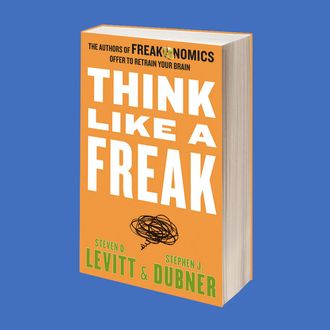
Think Like a Freak: The Authors of Freakonomics Offer to Retrain Your Brain, the new book from Steven D. Levitt and Stephen J. Dubner, contains a lot of good, counterintuitive advice.
The main goal of the book, which is out today, is to help free readers from the rut of standard, everyday thought processes. Its best recommendation for doing so is to “think small” — that is, to stop trying to solve everything at once using big, fancy ideas that don’t get results. Oftentimes, they argue, a bit of modesty and lowered ambitions are a better fit for a given problem.
Here are five ways to think smaller:
1. Know Your Strengths. “Humans are amazing at a lot of really important things,” Dubner told Science of Us. “But then there’s a lot of other pretty basic things we’re pretty crappy at. The problem is that our self-awareness generally isn’t so high.” As a result, we have a tendency to overestimate our ability to impose sweeping changes or fixes on big, complicated systems, and when we attempt to we often cause more harm than good.
2. Stay in Your Lane. Dubner and Levitt critique “the habit of giving opinions and advice on matters outside of one’s knowledge or competence,” and explain that this haughty syndrome is rampant despite a “sizable body of research” indicating that experts fare poorly when they wade into unfamiliar fields. Their (somewhat gleeful) example: Paul Krugman’s confident 1998 prediction that the internet would in the long run amount to little more than a flash in a pan.
3. Focus on Immediate Practical Solutions. The tidiest example of “thinking small” from the book is about three economists who found that only a tiny proportion of the schoolchildren who needed glasses in a “poor and remote” region of China had them. Once more kids got them, their test scores short up dramatically — all without any revamping of the curriculum, parental intervention, or other Big New Ideas. The kids just needed glasses.
4. Don’t Be a Very Serious Person. “Seriousness of a certain sort can be a cover for not knowing what you’re doing,” said Dubner. In Think Like a Freak, he and Levitt decry the joyless way so many people — particularly politicians and academics — go about their business. To solve problems creatively, they write, it’s important to be having fun, because “if you love your work (or your activism or your family time), then you’ll want to do more of it. You’ll think about it before you go to sleep and as soon as you wake up; your mind is always in gear. When you’re that engaged, you’ll run circles around other people even if they are more naturally talented.”
5. Ignore Your Friends. Think Like a Freak emphasizes that one of the biggest obstacles to adopting its suggestions is social pressure. Psychologists know from a long line of research, most colorfully highlighted in Solomon Asch’s conformity experiments, that we’re powerfully affected by what those around us are doing. “People like to be in sync with their friends and families and co-workers,” explains Dubner. “A lot of what we describe will maybe make you a little bit out of sync, but I think it’s worth it.”




